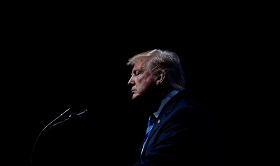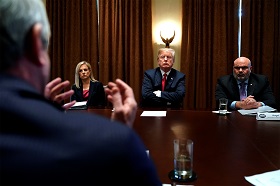The transformation of “Russiagate” into “Spygate”, underscores that it was the United Kingdom, through its various intelligence units that "meddled" in the 2016 U.S. presidential elections. The mainstream U.S. media are attempting to cover-up for that operation, by reducing "Spygate" to a semantic debate over whether deploying operatives into the Trump campaign is "spying", "infiltration," a necessary defense against Russian aggression, or a figment of Trump's “paranoia”. The story is complicated, but enough facts have now emerged, that it can be stated definitively, that there was a joint operation by Anglo-American intelligence, designed to entrap Trump campaign officials, through a classic "sting" operation.
Key to this are three operatives with ties to the CIA, FBI and MI6 — Joseph Mifsud, Alexander Downer and Stefan Halper. These three were deployed to manipulate low-level Trump officials Carter Page and George Papadopoulos into believing they would be working with Russian intelligence networks, which wanted to help Trump, to establish links which could then be cited as channels of Russian influence into the Trump campaign. This kind of "sting" and "entrapment" operation has been used repeatedly by the FBI, against both "left" and "right" oppositionists. It was deployed against the civil rights movement — including in the targeting of Dr. Martin Luther King, Jr. — against the anti-war movement in the late 1960s-early 1970s, against the Ku Klux Klan, in Abscam and Brilab attacks on pro-labor elected officials, and, more recently, with FBI plants into alleged terror cells since 9/11.
This Russiagate operation was launched between July and September of 2016, around the time that Trump won the Republican Party nomination, and shortly after Obama's CIA Director John Brennan had set up an inter-agency task force, with James Clapper, the Director of National Intelligence, to investigate alleged Russian efforts to influence the outcome of the election. Brennan was initially steered in this direction by Robert Hannigan, then head of Britain's electronic warfare division, GCHQ. He and Clapper convinced FBI Director James Comey and other top FBI officials — including the FBI's liaison with Brennan, Peter Strzok — to open an FBI investigation. Strzok was directed to meet with "ex"-MI6 agent Christopher Steele in London on July 5, to be briefed on the "memos" Steele was drafting, alleging multiple channels of Russian influence on Trump, including fictitious sexual blackmail tapes. By July 31, 2016, the FBI "investigation" was launched, which was used to justify the deployments of the "spies," who were, in fact, in motion before then.
Discussion
The transformation of “Russiagate” into “Spygate”, underscores that it was the United Kingdom, through its various intelligence units that "meddled" in the 2016 U.S. presidential elections. The mainstream U.S. media are attempting to cover-up for that operation, by reducing "Spygate" to a semantic debate over whether deploying operatives into the Trump campaign is "spying", "infiltration," a necessary defense against Russian aggression, or a figment of Trump's “paranoia”. The story is complicated, but enough facts have now emerged, that it can be stated definitively, that there was a joint operation by Anglo-American intelligence, designed to entrap Trump campaign officials, through a classic "sting" operation.
Key to this are three operatives with ties to the CIA, FBI and MI6 — Joseph Mifsud, Alexander Downer and Stefan Halper. These three were deployed to manipulate low-level Trump officials Carter Page and George Papadopoulos into believing they would be working with Russian intelligence networks, which wanted to help Trump, to establish links which could then be cited as channels of Russian influence into the Trump campaign. This kind of "sting" and "entrapment" operation has been used repeatedly by the FBI, against both "left" and "right" oppositionists. It was deployed against the civil rights movement — including in the targeting of Dr. Martin Luther King, Jr. — against the anti-war movement in the late 1960s-early 1970s, against the Ku Klux Klan, in Abscam and Brilab attacks on pro-labor elected officials, and, more recently, with FBI plants into alleged terror cells since 9/11.
This Russiagate operation was launched between July and September of 2016, around the time that Trump won the Republican Party nomination, and shortly after Obama's CIA Director John Brennan had set up an inter-agency task force, with James Clapper, the Director of National Intelligence, to investigate alleged Russian efforts to influence the outcome of the election. Brennan was initially steered in this direction by Robert Hannigan, then head of Britain's electronic warfare division, GCHQ. He and Clapper convinced FBI Director James Comey and other top FBI officials — including the FBI's liaison with Brennan, Peter Strzok — to open an FBI investigation. Strzok was directed to meet with "ex"-MI6 agent Christopher Steele in London on July 5, to be briefed on the "memos" Steele was drafting, alleging multiple channels of Russian influence on Trump, including fictitious sexual blackmail tapes. By July 31, 2016, the FBI "investigation" was launched, which was used to justify the deployments of the "spies," who were, in fact, in motion before then.
The central role of John Brennan in the anti-Trump, regime-change coup has come into increasing prominence, as has that of James Clapper in the ongoing investigations. Their role becomes more clear when one strips away the fictional stories being circulated about Russian "meddling" and "hacking", and realizes that what they, and their allies found most offensive about the prospects of a Trump presidency was his repeated comments about desiring an improved, cooperative relationship with Russia and President Putin. Trump's desire to reverse the dangerous and provocative policies against Russia (and China) of his predecessors, George W. Bush and Barack Obama, defines the background story of Russiagate.
Brennan has a history of anti-Russian activity, which includes direct U.S. support for the anti-Yanukovic coup in Ukraine, and in providing military weapons, training and logistic support for anti-Assad rebels in Syria, much of which ended up in the hands of the IS and Al-Qaeda terrorists. Since leaving his position at the CIA, he has been increasingly critical of both Trump and Putin, in tweets, as well as in commentaries on major U.S. networks. As for Clapper, one needs only to hear the sharply Russophobic comments he unleashed in Australia on June 6, 2017, to see his bias. After stating unequivocally that "the Russians are not our friends," he added that there are "irreconcilable differences" between the two countries, as it is in Russia's "genes to be opposed, diametrically opposed, to the United States and Western democracies."
Thus, there should be no surprise to see the close collaboration between those two, and the task force they established, with their equally obsessed anti-Russian counterparts in British intelligence.
The purpose of the Mifsud/Downer/Halper operation was summarized by George Parry in the American Spectator on May 22, 2018. In "The Papadopoulos Affair: Such a Downer," Parry writes that the hapless Papadopoulos was "manipulated to repeat a planted, fictitious story about Clinton dirt and emails in order to create the appearance of collusion by the Trump campaign with the Russians and a prefabricated predicate for the FBI investigation of that campaign." In other words, this was a classic sting operation, where the "investigators" suggest the "crime" and then blame it on their targets.
From the beginning, the LaRouche movement in the United States has reported that there was no Russian meddling or Trump collusion, but a joint effort by U.S. and British intelligence agencies to defeat Trump, or remove him once he was elected. In addition to Parry's article, which confirms the analysis of LaRouche, a spate of others making that point have appeared. Publius Tacitus, on the Sic Semper Tyrannis blog of former military intelligence specialist Col. Pat Lang wrote that the new evidence "removes any doubt that British and U.S. intelligence services collaborated in a devious and fabricated scheme...."
Another article appeared in the American Spectator on May 25, by George Newmayr, "The London-to-Langley Spy Ring," which details the new evidence emerging. Here, the most significant is the Gateway Pundit blog, with an article by Jim Hoft, who writes that a foreign government did meddle in the election, "but the government identified is the U.K., not Russia." He asserts that those behind Russiagate "were willing to risk World War III with Russia rather than face a Trump Presidency."
The article fails to describe that which running the sting feared the most. They feared that Trump would overturn the hostile geopolitical policies on which their careers and their fortunes depended, thus promoting confrontation with Russia and China. That Trump might bring the U.S. into a full collaboration with the emerging New Paradigm, led by China and Russia, generated the hysterical response to his election and the fiction known as Russiagate. It is this which completes the picture, and makes clear why this regime change operation against Trump must be shut down.






